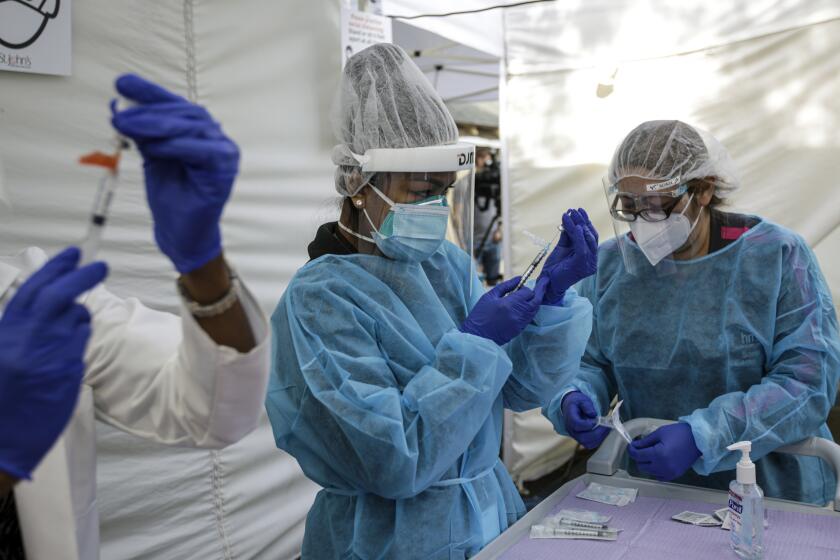I have long COVID. Here’s how to get the care you need

- Share via
Navigating the U.S. healthcare system can be challenging, and people who have long-term symptoms of COVID-19, like me, and others with chronic, long-lasting health conditions often have to be their own advocates. After I wrote about my experiences with long COVID, I received hundreds of emails from readers asking how to organize and get the care they need.
You don’t need to love spreadsheets like I do, but being organized and thorough with your medical bills, paperwork and appointments can be immensely helpful in communicating with healthcare professionals well. So here are some organizational tips and strategies I’ve learned and that I’ve heard from patients, doctors and experts.
Be organized
When it comes to appointments, call early, and call your doctors’ offices often. Sometimes other patients cancel, so you might be able to squeeze into an earlier appointment. I like to put all of my appointments on my calendar and include reminders to myself to call and schedule the next appointment on my fridge. If it’s out of sight, it may also be out of mind. I also find putting all my doctors in my phone under a “doctor” group helps me find them easily when I inevitably forget the name of the specialist I am seeing. I also include their address and hours of operation so I know when to call.
You can organize your notes in a binder, a spreadsheet or a notebook, as long as you keep the notes detailed and put together.
You know your body best. So if you aren’t feeling well, write it down and bring it to your doctor’s attention. Write down how long you have been having the symptoms, your pain level and the date the symptoms started. I find it is helpful to put these into a spreadsheet — especially when you are having conversations with doctors and they ask you ask you to describe your symptoms in detail. I created this spreadsheet so I always had a log of everything I needed to track, especially my heart rate and oxygen, which, as a long COVID patient, are helpful markers to share with my doctor.
We all dread medical bills, but being a patient with a chronic illness means getting lots of bills and explanations of benefits (EOBs) in the mail. I organize my papers in a folder and don’t pay bills unless I get an EOB to confirm what I actually owe after insurance. When you make payments for bills, make sure you log these in a notebook or spreadsheet so you don’t forget you paid. And if you have a question, ask the billing department.
Column One: Being a COVID long hauler has taught me to be fearless, push back and take lots of notes
More than one year after Sandhya Kambhampati was diagnosed with COVID-19, she shares her story as she continues to recover.
Take notes
Take notes during your appointments, and ask your doctor to do so as well.
As a patient, you can also ask to see the doctor’s notes.
Let’s say you are having heart palpitations and you ask your doctor for an EKG. “If your doctor refuses to give you a test, especially if it’s a simple test, ask the doctor to document that they declined to give you the test,” said Dr. David Putrino, director of rehabilitation innovation for the Mount Sinai Health System. “It’s a nice way to quite calmly signal to the physician that you are asking for a reasonable thing.”
If you aren’t getting the care you need, you can try to find a new doctor, Putrino said.
Support groups, such as Body Politic, might be able to recommend a doctor in your area or help navigate appointments.
California’s new proof-of-vaccination requirement: What you need to know
Be patient
Have a reasonable expectation about what is going to happen when you go to the doctor’s office. Walking away with perfect clarity and a cure right away may be unlikely. Instead, you may have a referral to a specialist who can ask deeper questions and conduct testing to figure out what’s wrong.
For patients dealing with long COVID, not every doctor or healthcare system is responding well to patients dealing with the aftereffects of the virus. “Patients should not have to advocate for themselves, but they are getting horrendously gaslit at the moment,” Putrino said.
Unfortunately, some doctors will discount long COVID as the cause of your symptoms because it doesn’t fit into a preexisting diagnostic box. But you should believe that your symptoms are real, said Dr. Zackary Berger, associate professor of medicine at Johns Hopkins University.
Mount Sinai in New York City was one of the first rehabilitation care centers for patients with long COVID, so Putrino has had lots of patients from all over the country reaching out for advice. One thing he suggests is going to appointments with a printout or screenshot of the CDC guidelines that state that programs don’t need to require positive antibody tests or positive PCR tests to diagnose patients with long COVID.
“There’s a lot of discussion on what causes long COVID, and it would be great if there were one thing to point to,” Berger said. Unfortunately, there isn’t.
And be kind to yourself and others. Many people with long COVID face stressors they can’t control, and that can make the condition worse. Talk to your doctors about your housing and psychological or other stressors, Berger said.
It seems simple, but you’d be surprised how asking nicely and politely can help when dealing with billing, appointments and tests.
It used to be hard to find a vaccine appointment. Not any more. Here’s how to get your COVID-19 shot.
Prioritize
You may have multiple symptoms you want to tell your doctor about, but keeping your appointment focused on your three worst symptoms is a good strategy, said Dr. Alice Perlowski, a cardiologist in Southern California. “Think about the three things that prevented you from doing work, physical exercise or having fun,” Perlowski said.
Also, know what kind of doctor you are going to see. Don’t start with your stomach problems when you are talking to the cardiologist.
When in doubt, ask
If you think of a question while doing laundry or making lunch, write it down. When you go to the doctor’s office, collect all of your questions and ask them during your appointment.
I often repeat what the doctor says to me back to them to make sure I’m understanding the diagnosis or test properly. If you’re having a test, ask about any restrictions you may need to keep in mind.
Misinformation about COVID-19 vaccines is costing people their lives. We separate the myths from the reality.











